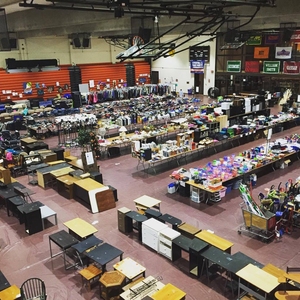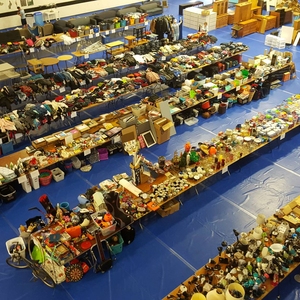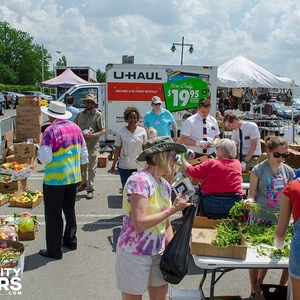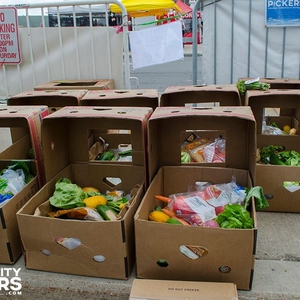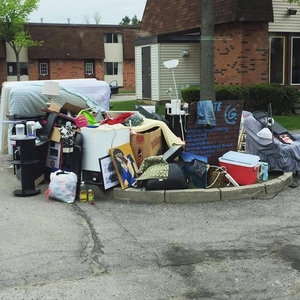Recovery and Reuse; On-Campus and Off
Rochester Institute of Technology
Project Overview
Many of the challenges sustainability seeks to address can be challenging to visualize. Moreover, the scale of these challenges can stifle the motivation to act before one even begins. These two projects, Goodbye Goodbuy! and Flower City Pickers Inc., have and continue to create empowering, memorable, and impactful experiences for anyone willing to set aside a few hours. Each project focuses on volunteer-driven waste recovery and redistribution. Goodbye Goodbuy! is a student-led move-out collection move-in sale program which has recovered and resold over 100 tons of usable, landfill-bound furniture, clothing, electronics, and other home items for a value of $67,500 over three years which has been used to hire and compensate over 25 student employees to manage the program supported by over 600 individual volunteers. Flower City Pickers Inc. is a volunteer-driven non-profit organization based out of the City of Rochester Public Market which recovers, sorts, packages, and distributes ~3,500 lbs. of surplus produce and bread to a network of 15 shelters and pantries each week. As a current and former Director of each of these programs, my case study focuses on waste recovery and redistribution as a platform for civic engagement facilitation and developing and maintaining mutually enriching university-community partnerships.
Background
Each of these projects began around the same late 2014, early 2015 time-frame but were each inspired by events of nearly opposite nature. The surge of usable, landfill-bound waste on college campuses creating dumpsters overflowing with treasure is a well known phenomenon observed annually at RIT. Two students, and later myself, supported by RIT Sustainability and Program Advisor, Enid Cardinal as well as The Center for Residence Life, began and led the first attempt to channel this surplus of items that would inevitably be purchased again in less than 4 months when new students moved in. In this case, frustration with abundance yielded action. The story of Flower City Pickers starts in a former settlement of approximately 45 homeless and displaced people in the Rochester area once known as Sanctuary Village. In an act of prejudice and deceit, this settlement was bulldozed and landfilled after many residents were accepted an offer from the City of Rochester for a two night stay in a nearby hotel. The Rochester community, understanding how harsh winters here can be, were moved to action. One person, Khoury Humphrey, began to visit the sprawling City of Rochester Public Market every Saturday and collect edible or unsold produce right off the curb for distribution to communities affected by the destruction of Sanctuary Village. Fast-forward 3 years and the newly formed Flower City Pickers has recovered and redistributed almost 600,000 lbs. of food to shelters, meal centers, livestock owners, and local farmers with the help of several hundred individual volunteers. I have been involved with the Flower City Pickers for the past two-and-a-half years as a campus coordinator and volunteer recruiter, Data Collections Chair, and Director of Impact.
Goals
Both of these projects aim to increase the community resiliency of either the RIT or Rochester homeless community in tangible and immediate through the recovery and redistribution of various forms of usable waste while creating carbon-negative platforms of involvement and participation available to the whole community.
Implementation
The implementation of Goodbye Goodbuy! was first proposed by Nicholas Giordano and Nimrun Dhilon, both RIT Seniors at the time they began actively working on the project in a full-time and part-time capacity under RIT Sustainability. At its core, Goodbye Goodbuy had obtain as much volunteer labor, space, financial support, and community participation as possible. Finding volunteers during finals week was challenging, but to the credit of the RIT community, 186 individual volunteers worked anywhere from three to 48 hours over the first week of collection. During this time I began to work on the project part-time as a Program Coordinator. In order to physically process all of the available material, the Goodbye Goodbuy program team identified 4 primary sorting and processing locations. Items were processed in a studying and tutoring center located on the first floor of one of the residence halls as well as in another office on the opposite side of campus which was designated for processing clothing and food. Items were stored and priced in eight rented 53' tractor-trailers as well as in the basement of a dairy-barn located on the property of the house of the President of the University, Dr. Bill Destler, and his wife Dr. Rebecca Johnson. Two 16' box-trucks were rented and an arsenal of plastic totes donated from Goodwill and hand-trucks donated from the Center for Residence Life were the core equipment needs we met in the first year. Gratitude is owed to the Destler-Johnson family, The Office of Parking and Transportation, and The Center for Residence Life for their willingness to try something new. Over the following summer all electronics were tested, textiles were treated for bedbugs, all items were priced and logistical arrangements were made for the upcoming sale which generated $18,000 during year-one. To include students living off-campus and without vehicles, curb-side furniture delivery was offered for an additional $10-15. I became the Director of the program for year-two and was able to apply revenue from year-one towards hiring a Volunteer Coordinator and Marketing Manager as well as a total of nine students who worked for either the week of collection or sale and were paid on stipend. After the year-two sale we had generated $24,500 which supported an even larger staff the following year.
The implementation of Flower City Pickers (FCP) is much more scrappy and organic. With no established institution to support the growth of the fledgling organization FCP relied then, as it does now, on community support and grassroots organizing garrisoned by the RIT and University of Rochester student community. Over time, seeing the collection team of Flower City Pickers every week allowed the market vendors to establish relationships with our organization and the quantity of donated material began to rise. With it so did the need for additional channels of distribution and volunteers to process and sort donated food. When the collective organizing was becoming too much for one person to shoulder, Khoury established a Board of Directors that would include myself. Inspired by my time with the Goodbye Goodbuy program, I began looking for growth opportunities within the market and eventually we expanded from operating once a week to operating three times a week which more than doubled our total weekly recovery tonnage which jumped as high as ~12,000 lbs in one week. Volunteers for our Tuesday/Thursday operations became available through a partnership with Heritage Christian Services which works with children and adults with developmental disabilities. FCP operates out of a 1960s half-length school bus which no longer starts and is used to store folding tables, tents, heaters, (we work outside, even through the winter), and all the other equipment we need to do our job. Additionally, I wanted FCP to be able to articulate it's value to potential benefactors and partners and so I began to collect data on every single box of food we processed beginning in October of 2015. Doing so has created more opportunities for partnerships, improved grant eligibility, and even for waste prevention. Khoury, the founder of Flower City Pickers, will be passing the organization off to me as he leaves Rochester for Oklahoma City.
Timeline
Both of these projects are ongoing and and a timeline for the year I directed Goodbye Goodbuy can be found attached to this application.
Financing
Goodbye Goodbuy was supported with an initial investment of $10,000 from RIT Sustainability and $2,000 from the Center for Residence Life. The program is now sustained on the revenue it generates as part of it's operations which reached $67,500 this past year.
Flower City Pickers has received one-time donations from organizations such as Rochester First Unitarian Church, The Knights of Columbus, The City of Rochester Public Market, and individual donors. Flower City Pickers is currently in the process of obtaining our 501.C.3 status.
Results
Goodbye Goodbuy's impact can be measured a number of different ways: - Over 100 tons of material diverted and reused over three years - Cost savings of ~$202,500 realized for the RIT Student body (average item discount is 75% off, cost savings assertained based on total revenue relative to average discount percentage) - Over 30 student employment opportunities generated - ~5,400 service hourse facilitated by the Goodbye Goodbuy program - ~500 apartments worth of furniture delivered to off-campus students
Flower City Pickers Impact to Date: - Over 300 tons of material diverted and reused over three years - ~7,800 service hours facilitated by Flower City Pickers - ~1,560 50 lb. boxes delivered to shelters - Engaged with 28 shelters, hunger relief agencies, and meal centers in the Rochester area.
Lessons Learned
One of the primary things I've learned through my involvement and direction of these twin projects has been that trust and tenacity are a powerful combination when applied to sustainability. I've learned how important it is to raise awareness to solutions and opportunities for improvement on issues of sustainability as it is to raise awareness of the issues targeted by these improvements and that people really will show up to help when provided a well organized opportunity to do so. I've learned that to grow an organization it's crucial to focus on empowering its members with the knowledge and responsibility needed to increase impact. I also believe these projects have acted as a reality check for me with regard to the scale of the issues. Knowing that more than 80,000 tons of food can be wasted each day and understanding how much work is involved in redistributing just 300 tons has positioned me to grapple with the logistical and systemic challenges that create this problem in the first place. I believe this applied experience will allow not only myself but all those involved in these projects to be more effective change-agents into the future.

